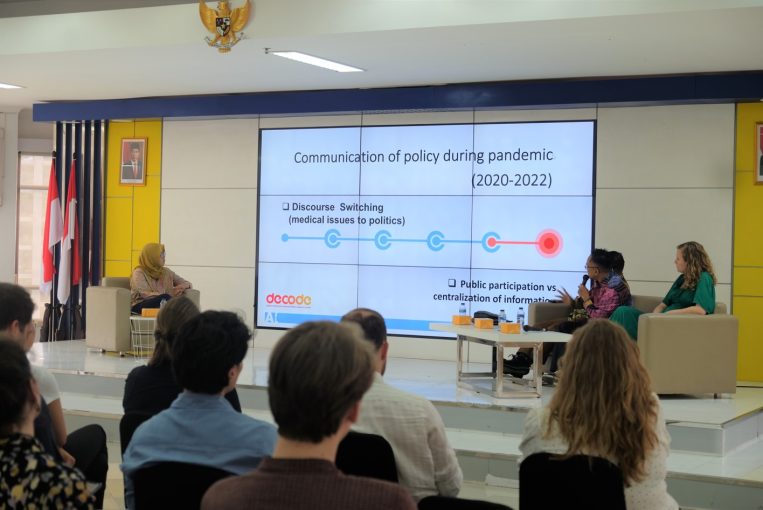
Yogyakarta, May 11th 2023─In collaboration with Puskapol UI, the Election Corner of Fisipol UGM conducted a study to examine how two main issues, namely “postponement of elections” and “integrity of the election’s administrators” affect public trust in electoral democracy. This study was carried out through big data analysis research as well as analysis of discourse and actors through online media coverage and Twitter in the period from January 1st, 2022 to March 2nd, 2023. Apart from that, this joint collaboration also analyzed several electoral political events that are considered controversial, at least until mid-April 2023.
The joint study resulted in several main points. First, the postponement of elections and the integrity of election organizers do not stand alone but are accompanied by a three-term discourse for the President, or the connection between the issue of postponement of elections and the interests of oil palm companies. The news of the postponement of the election reached its highest peak due to the momentum of student actions/demonstrations at the DPR RI Building. Just like the issue of postponement of elections, the emergence of election integrity issues does not stand alone. This issue comes together with other problems, such as the abuse of authority by election administrators; money politics; fraud at every stage of the election; irresponsible use of media, information and technology, and data; to low public participation and oversight in elections.
Second, influencer accounts and online media play a significant role in influencing the discourse on postponing the election. Especially, related to the discourse on postponing elections and the integrity of election organizers which has begun to strengthen, although the actors involved in this discourse are still very limited. In addition, the mapping of news topics in the mass media also shows that the figures’ utterances have been amplified on various news sites.
Third, the low involvement of election organizers accounts in the discourse on postponing elections and the integrity of election organizers. This discourse has not significantly involved the election management bodies, neither the General Election Commissions (KPU) nor the General Election Supervisory Agency (Bawaslu). It can be seen how limited the role of election organizers is in processing public discourse regarding the postponement of elections. This is quite worrying considering the momentum of an issue or discourse can change quickly on Twitter.
Fourth, the mapping of news topics in the mass media shows that the words of political figures have been amplified on various news sites. In this context, a number of figures voiced their views regarding allegations of fraud in the 2024 Election and questioned the role of election organizers (Bawaslu and KPU). Apart from that, behind the complexity of the election integrity issues at every stage, there are closely guarded actors who are seen as playing as “free riders” to delegitimize election organizers and administration.
Fifth, namely related to the discourse on postponing the General Election which is dominated by sentiments of rejection. Even though there has been an increase in the number of conversations on Twitter and online media regarding the issue of postponing the election, the dominant sentiment is rejection of this discourse. The rejection was expressed not only by the majority of Twitter users, but also by several political figures, academics and civil society. According to academics and civil society, the discourse of postponing elections or extending the term of office of the president is contrary to the constitution and cannot be considered a trivial matter.
Finally, there is the problem of low public awareness. Based on the analysis of actors and discourse, some figures, the media and the public have made efforts to continue to voice the issue of “Integrity of Election”. However, this issue has not been able to spark concern as well as wider public awareness. Therefore, serious efforts are needed from all parties, especially academics, activists and journalists, to strengthen this public trust.
The initial study above led to the conclusion that apart from being important to maintaining public confidence in electoral democracy, it is important for election organizers (KPU and Bawaslu) to take more active steps institutionally. Namely, to help direct public discourse about elections in Indonesia.
